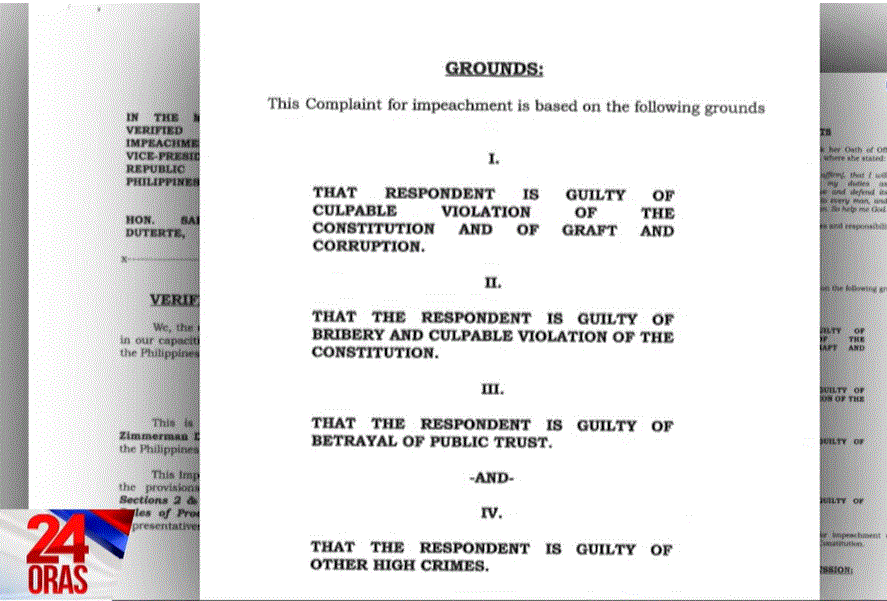What is impeachment and how does it work in the Philippines?

Impeachment in the Philippines is discussed in Article XI of the 1987 Constitution under "Accountability of Public Officers."
Section 1 emphasizes that "public office is a public trust," thus, "public officers and employees must at all times be accountable to the people, serve them with utmost responsibility, integrity, loyalty, and efficiency, act with patriotism and justice, and lead modest lives."
Article XI states that the president, vice president, members of the Supreme Court, members of the Constitutional commissions, and the Ombudsman may be removed from their posts "on impeachment for, and conviction of" the following:
- culpable violation of the Constitution
- treason
- bribery
- graft and corruption
- other high crimes
- betrayal of public trust
All other public officers and employees may be removed from office as provided by law, but not by impeachment, the Constitution said.
The impeachment process
The impeachment process begins at the House of Representatives where any member or citizen can file a verified complaint which shall be endorsed by any House member. This shall be included in the Order of Business within 10 session days and referred to the proper House committee within three session days thereafter.
After conducting a hearing and by a majority of votes by the panel members, the House committee shall submit a report to the House within sixty session days. The resolution will be calendared by the House within 10 session days.
“A vote of at least one-third of all the Members of the House shall be necessary either to affirm a favorable resolution with the Articles of Impeachment of the Committee, or override its contrary resolution. The vote of each Member shall be recorded,” according to Sec 3 (3) of Article XI.
“In case the verified complaint or resolution of impeachment is filed by at least one-third of all the Members of the House, the same shall constitute the Articles of Impeachment, and trial by the Senate shall forthwith proceed,” it added.
The approved resolution shall be endorsed to the Senate which will try to convict the impeached official. An official shall be convicted if two-thirds of the Senate votes.
“Judgment in cases of impeachment shall not extend further than removal from office and disqualification to hold any office under the Republic of the Philippines, but the party convicted shall nevertheless be liable and subject to prosecution, trial, and punishment, according to law,” Article XI further said.
But the Constitution clearly states that no impeachment proceedings shall be initiated against the same official more than once within a year.
Joseph Estrada was the first Philippine president to be impeached by the House of Representatives in 2000 due to charges of bribery and corruption.
However, his impeachment trial in the Senate in 2001 was aborted after senators rejected the presentation of an envelope that supposedly contained evidence against Estrada. The said envelope reportedly contained a letter from the former president to a bank official official requesting that he be allowed to open an account under the name of Jose Velarde.
The rejection of evidence prompted a walkout from the prosecutors, and eventually resulted in the second People Power. But the same charges were filed against him at the anti-graft court.
After Estrada, other top officials were also impeached including former Ombudsman Merceditas Gutierrez, former Supreme Court Chief Justice Renato Corona in 2011 and and former Commission on Elections chairperson Andres Bautista in 2017.
Both Gutierrez’s and Bautista’s Senate trial were aborted after the two resigned from their posts.
Corona, on the other hand, was convicted in 2012 for betrayal of public trust and culpable violation of the Philippine Constitution.
Vice President Sara Duterte is the latest official subject of possible impeachment after advocacy groups filed a complaint and endorsed by Akbayan party-list Rep. Perci Cendaña.
The complaint stemmed from Duterte’s alleged culpable violations of the Constitution, graft and corruption, bribery, betrayal of public trust, and other high crimes.
Three other complaints were filed since the first filing on December 2, 2024. The fourth complaint was endorsed by 215 House members on Wednesday, February 5, 2025, effectively transmitting the case to the Senate, where a trial will now commence as provided for in the 1987 Constitution.
—LDF/RSJ, GMA Integrated News




